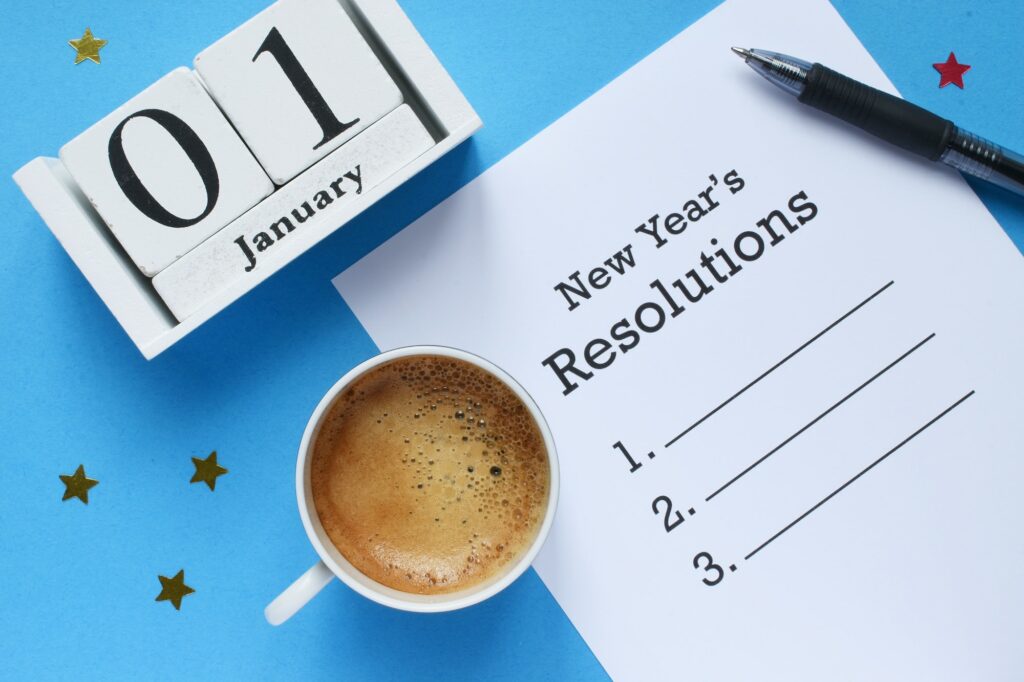Quitting smoking, losing weight, and regular exercise are three popular New Year’s resolutions that we all know not everyone sticks to in the new year.
Why don’t we keep our New Year’s resolutions?
Resolutions come down to making a long-term behavioural change that makes it a habit. The fact that so many people go wrong has to do with the gap between intention and behaviour. Setting great intentions is no guarantee for consistent behaviour. Even though being motivated and initiating a change is easy, sustaining this change in the long term is more complicated. Yet, A good intention can become a habit when you repeat the conscious action in the same way often enough.
Resolutions also fail for other reasons. Many good intentions are too ambitious. Moreover, we make resolutions because we think it is necessary, but we don’t want this.

A theme can help set and keep resolutions.
The golden tip to New Year’s resolutions is about choosing a theme. You can use this theme as a guideline when setting goals throughout the year. This way, you stay inspired and motivated. And if a holiday, weekend away, illness, or other event comes up in between, you can easily adjust without feeling like a failure or experiencing emotional dysregulation.
If you would like to lose weight, that goal would fit well with a theme such as fit and healthy. In the winter, you could improve your diet one step at a time. In the spring, you can choose to go for a daily walk. In the summer, you can work on reducing feelings of stress, and in the fall, you could start attending an indoor sport.
Forming a habit takes a while.
Choosing a theme can be an excellent place to start. But if you still want to be fit and healthy a year from now, you have to make it a habit, which might take longer than a month or a year.
How long it takes to form a habit depends on the type of behaviour. With sports, for example, this can take a little longer. That’s because it consists of many steps: making an appointment, packing your things, going to the gym, and changing clothes there. It can then help to focus on the initial steps, such as packing and preparing your gym bag the night before.
Make it part of daily routines.
To make good intentions a habit, choosing a fixed time or time when you do this is essential. Imagine: you want to eat more fruit. Then, building that into your daily routines at a fixed time is essential. You can do this according to the if-then principle. When I’ve had lunch, I’ll eat fruit.
You shouldn’t have too many resolutions. The more we try to do at once, the more likely we fail. If your resolution is really important to you, set the bar low.
On the other hand, you can choose a behavioural change that has more than one positive outcome. For example, walking with your partner or a friend. It is good for your health, and also good from a social point of view.
Rewarding yourself can give you confidence.
Rewarding and punishing yourself for preventing yourself from falling into old habits is not recommended. Focus on the next step and get your reward from the sense of progress you’re making. You don’t need an external reward when you see you’re making progress toward an important goal. The result is the reward.
Yet, a reward can be a moment to reflect on the fact that you have been able to keep it up for a week or month. That is also good for your self-confidence as long as you don’t do it for the reward and you don’t reward yourself too often.
Other things to avoid are setting too many goals, quitting after a relapse, and being too hard on yourself. Start each day with a clean slate, even though you may have given up yesterday. Gradually you learn what works and what doesn’t, and you can make better choices in the future. Be kind to yourself and take your time. Then resolutions can happen for sure!
Short-term Counselling and Coaching to Make a Resolution Plan.
At La Ronge Counselling, we can help you develop a plan you can stick to. With monthly check-in sessions, you can discuss progress as well as barriers. Under guidance, you can continuously adapt your resolution to make it into a habit-forming plan. If you want to make a change happen, please book a free intake session.














